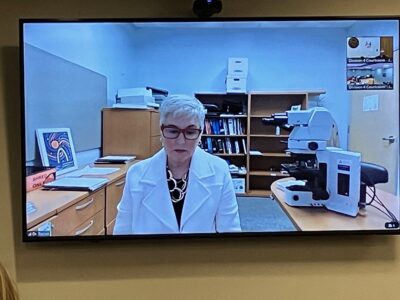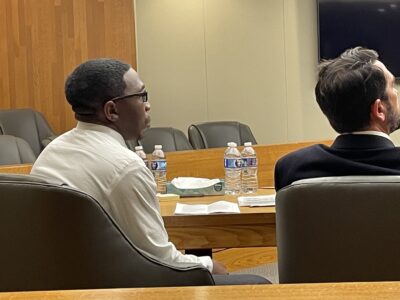Judge again considers — and again denies — defendant’s motion to suppress confession in Montessori child sex crimes case

photo by: Kim Callahan/Journal-World
Mateo Wills appears at a hearing Wednesday, June 18, 2025, in Douglas County District Court.
A Douglas County judge on Wednesday again considered — and again denied — a defendant’s motion to have his confession to child sex crimes suppressed from ever being heard by a jury of his peers.
Hatem Chahine, the attorney for 22-year-old defendant Mateo Clavel Wills, a former Raintree Montessori School employee accused of sexually abusing a 3- and 4-year-old more than three years ago, asked Judge Sally Pokorny to reconsider a motion to suppress that she had already denied last winter.
Chahine’s reasoning was that a Kansas Court of Appeals case decided a week after Pokorny’s January ruling changed the analysis that a court must do. One of the grounds for a court to reconsider a ruling in a case is a change in law before final disposition of a case.
Specifically, Chahine argued that, according to the new case, State v. Reynolds, where there’s a confession but no “tangible injury” or evidence to corroborate the confession, the court must examine the trustworthiness of the defendant’s incriminating statements.
Chahine argued that in two of the four counts of aggravated indecent liberties against Wills there was no tangible evidence, no injury, no medical records and nothing but “hearsay” by parents and Wills himself, necessitating under Reynolds that the trustworthiness of the confession be examined via an evidentiary hearing.
The state, represented by special prosecutor Joshua Ney, argued on Wednesday that Reynolds was not applicable to Wills, that the facts of the two cases were very different, and that Reynolds did not create new law requiring a new analysis — a position with which Pokorny ultimately agreed, saying, “I think Mr. Chahine is misinterpreting” the definition of tangible injury.

photo by: Kim Callahan/Journal-World
Defendant Mateo Wills, from left, attorney Hatem Chahine and Judge Sally Pokorny are pictured Wednesday, June 18, 2025, in Douglas County District Court.
Pokorny noted that many sexual assault cases do not have “tangible injury” to corroborate a confession. Under the legal doctrine of corpus delicti, a confession without some kind of corroborating evidence — for example, a confession of murder where there’s no body — is not enough for a conviction, Pokorny noted, but here, she said, there was sufficient evidence corroborating Wills’ confession and a separate hearing on the trustworthiness of the confession was not required.
Tangible evidence, she said, did not mean bruises and physical injury but simply referred to “corroboration” of the confession “that you can put your finger on.”
Some of that corroboration in Wills’ case, she said, included that Wills made the incriminating statements to police both before and after he was arrested, that he did so calmly, coherently and deliberately, that two Raintree students reported to their parents being touched inappropriately, and that one described it in some detail to police.
She also noted that police did not trick or pressure Wills into making the incriminating statements, which, as the Journal-World has reported, included that he “went too far” while touching the children at naptime, that he was curious about vaginas and that he felt bad about touching them but felt good that “I got caught.”
The police interrogation was “the kindest and gentlest” she had seen in nearly 50 years working in criminal law, said Pokorny, repeating her observation from her January ruling denying the motion to suppress.
By contrast, the police in the Reynolds case engaged in yelling and suggestive questioning of an intellectually disabled defendant with an IQ of 62. Wills, Pokorny noted, was a working man with a high school education, an “above average IQ” and no diagnosed mental health issues.
All of those pieces enhanced the trustworthiness of the confession, Pokorny said, denying Chahine’s request for a separate hearing on trustworthiness.
After disposing of the motion in a case that has been mired in delays, Pokorny entered a not guilty plea for Wills and set his trial for Oct. 27. He is currently on house arrest with a $100,000 own-recognizance bond.
The charges he faces are off-grid felonies and could result in a life sentence if he is convicted.






